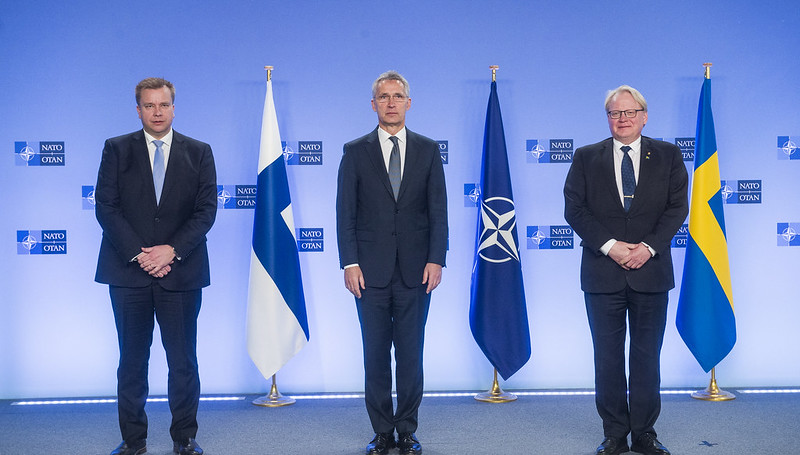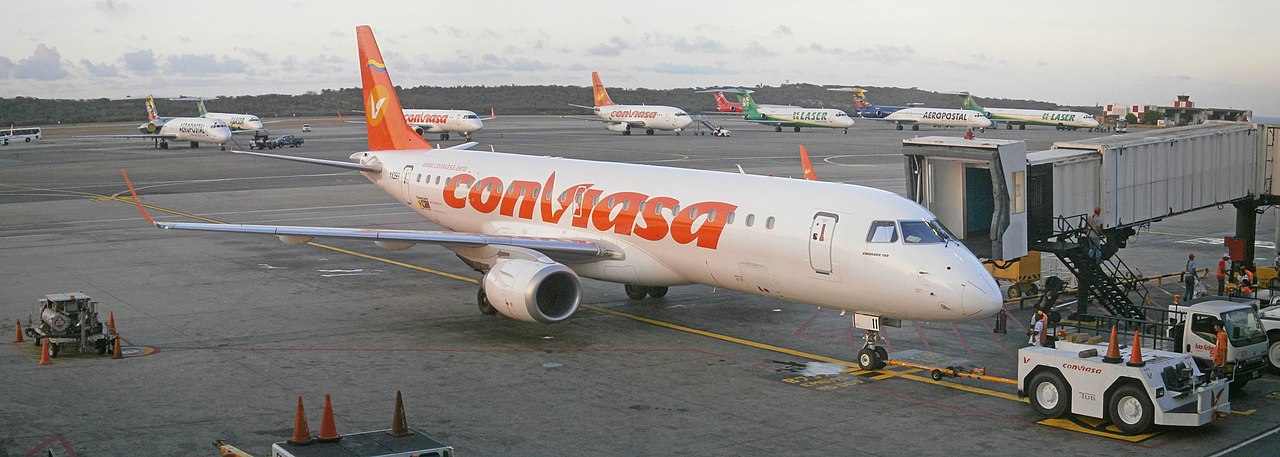
NATO Secretary General meets with Ministers of Defense for Finland and Sweden, March 2022.
“…Of course, this means the deterioration of our strategic position….”
Russian reactions to the recent decision by Finland and Sweden to join NATO have ranged from mild concern to grave trepidation. According to the excerpted article from the pro-Kremlin news outlet RIA Novosti, President Putin does not foresee any serious problems with this decision, provided that no “military infrastructure of the alliance is deployed in Finland and Sweden.” If this were to occur, Putin stated that “Russia will be forced to respond in a similar way.” Putin also asserted that there was no merit to “the thesis that Russia’s goal to push NATO forces away from its borders, preventing Ukraine from joining the alliance, led to the opposite, only from Sweden and Finland.” Putin explained his rationale by claiming that “unlike Ukraine, Sweden and Finland do not persecute people who feel they are part of Russian culture.”
Other knowledgeable Russians have expressed greater concern over the further enlargement of NATO. In an interview in the popular daily Moskovskiy Komsomolets, “Ruslan Pukhov, the Director of the Moscow Center for Analysis of Strategies and Technologies (CAST), spoke about the military significance of NATO expansion in the northwest.” According to Pukhov, this expansion “means the deterioration of our strategic position.” He asserts that Russia will now “have to spend more on defense than before February this year [which will mean] that less money will be spent on infrastructure projects, healthcare, and education.” Pukhov reviews Russia’s long history with these two countries, stating “both the Swedes and the Finns have already experienced the power of Russian weapons,” which resulted in “bad memories for them.” He concludes that becoming members of NATO might tempt them to try to settle old scores, and that therefore Russia “can’t be weak.”
Source:
“Путин: Россия ответит в случае размещения баз НАТО в Швеции и Финляндии (Putin: Russia will respond in case of deployment of NATO bases in Sweden and Finland),” RIA Novosti (pro-Kremlin news outlet) 30 June 2022. http://RIA/Ru/20220629/Putin-1799133978.html
In Russia’s relations with Sweden and Finland, there are no such problems as with Ukraine, if they want to join NATO, let them join, but if the military infrastructure of the alliance is deployed in Finland and Sweden, Russia will be forced to respond in a similar way, Russian President Vladimir Putin said…
…He also called false and ‘having nothing to do with reality’ the thesis that Russia ‘s goal to push NATO forces away from its borders, preventing Ukraine from joining the alliance, led to the opposite, only from Sweden and Finland. “For us, the membership of Finland and Sweden in NATO is not at all the same as the membership of Ukraine, these are completely different things. They understand this very well. No. This is a completely different thing,” the Russian leader emphasized. He noted that, unlike Ukraine, Sweden and Finland do not persecute people who feel they are part of Russian culture.
Source: Olga Bozheva, “Вступление Финляндии и Швеции в НАТО принесло России серьезные риски (The accession of Finland and Sweden to NATO brought Russia serious risks),” Moskovskiy Komsomolets (popular, pro-Kremlin news organization), 5 July 2022. https://www.mk.ru/politics/2022/07/05/vstuplenie-finlyandii-i-shvecii-v-nato-prineslo-rossii-sereznye-riski.html
The process of accession of Sweden and Finland to NATO was continued. On July 4, negotiations between these countries and the Alliance were completed in Brussels. On July 5, the Foreign Ministers of Sweden and Finland signed the accession protocol at NATO Headquarters. Ruslan Pukhov, Director of the Moscow Center for Analysis of Strategies and Technologies (CAST), spoke about the military significance of NATO expansion in the northwest.
Now there are rather contradictory statements about the entry of Sweden and Finland into NATO. A number of political scientists say that this does not pose a serious danger to us. Someone thinks that we need to strengthen the borders, up to the deployment of tactical nuclear weapons there. What do you think their entry into the alliance means for us?
Of course, this means the deterioration of our strategic position. And not because these countries suddenly became anti-Russian overnight – even before that they loved us like a dog with a stick. However, they were not at least formally integrated into NATO structures, and accordingly, they behaved cautiously and correctly towards us.
…In any case, such a move by Stockholm and Helsinki does not lead to anything good. And the one who says that their entry into NATO means practically nothing to us, he, I think, is disingenuous.
…This will force us to invest more financially in the arms race. We’ve already gotten into it. And now it doesn’t matter at all whether we did it ourselves or were dragged into it. The score is on the scoreboard. We will have to spend more on defense than before February this year. This means that less money will be spent on infrastructure projects, healthcare, and education. There are no illusions here.
…Both the Swedes and the Finns have already experienced the power of Russian weapons… bad memories for them. They still remember very well how they got hit in the teeth from us. And if you suddenly forgot, so we can remind you…. So we can’t be weak.
Image Information:
Image: NATO Secretary General meets with Ministers of Defense for Finland and Sweden, March 2022
Source: https://www.flickr.com/photos/nato/51942155994
Attribution: CC BY-NC-ND 2.0

